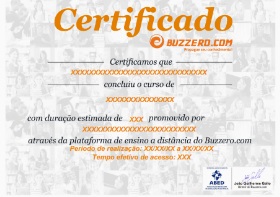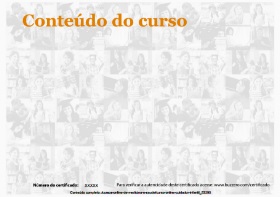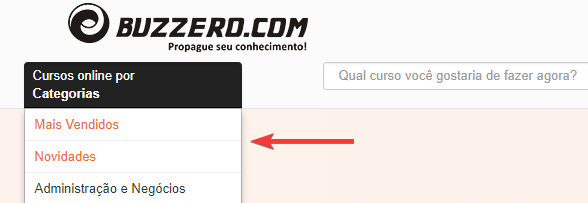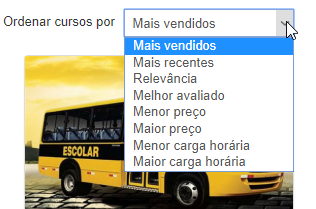
Curso Online de INGLÊS PRÁTICO E INTENSIVO
Curso prático, completo, intensivo e muito fácil de aprender inglês
Continue lendoAutor(a): Europalearning
Carga horária: 9 horas
Por: R$ 23,00
(Pagamento único)
Mais de 20 alunos matriculados no curso.
 Com certificado digital incluído
Com certificado digital incluído
Avaliação dos alunos: 1 no total
- Jonailson Freitas De Sena
- Aqui você não precisa esperar o prazo de compensação do pagamento para começar a aprender. Inicie agora mesmo e pague depois.
- O curso é todo feito pela Internet. Assim você pode acessar de qualquer lugar, 24 horas por dia, 7 dias por semana.
- Se não gostar do curso você tem 7 dias para solicitar (através da pagina de contato) o cancelamento ou a devolução do valor investido.*
- Adquira certificado ou apostila impressos e receba em casa. Os certificados são impressos em papel de gramatura diferente e com marca d'água.**
** Material opcional, vendido separadamente.
Modelo de certificados (imagem ilustrativa):
 Frente
Frente
 Verso
Verso
-
Definite Article: The
Definite Article: The
The definite article the is the most frequent word in English.
The = o, a, os as
Examples:
The Pope is visiting Russia. O Papa está de visita à Rússia.
The moon is very bright tonight. A lua está muito brilhante esta noite.
The boys are smart. Os rapazes são inteligentes.
-
Definite Article: The
Definite Article: The
-
Indefinite articles: a/an
Indefinite articles: a/an
A - Consoante
Antes de palavras que começam por consoante utiliza-se o artigo indefinido a, cujo significado é “um” ou “uma”.
Examples:
This is a book. Isto é um livro.
This is a lamp. Isto é um candeeiro.
This is a chair. Isto é uma cadeira. -
Indefinite articles
Indefinite articles
An - Vogal
Antes de palavras que começam por vogal utiliza-se, regra geral, o artigo indefinido an, cujo significado é também “um” ou “uma”.Examples:
An apple; an orange; an opera. -
Indefinite articles: a/an
Indefinite articles: a/an
Por questões fonéticas, existem palavras em que a primeira letra é consoante mas o artigo a usar será an e palavras em que apesar da primeira letra ser vogal, o artigo a utilizar será a.
Examples:
An hour, a university, a European, a unit.Plural: This is a book / these are some books
Isto é um livro. / Estes são alguns livros. -
Singular and plural nouns
Singular and plural nouns
For the plural form of most nouns, add s.
Examples:
bottle – bottles cup – cups
pencil – pencils desk – desks
sticker – stickers window – windows
For nouns that end in ch, x, s, or s sounds, add es.
box – boxes watch – watches
bus – buses -
Singular and plural nouns
Singular and plural nouns
For nouns ending in f or fe, change f to v and add es. Examples:
wolf – wolves wife – wives
life – lives
Some nouns have different plural forms. child – children woman – women
man – men mouse – mice -
Singular and plural nouns
Singular and plural nouns
Nouns ending in vowels like y or o do not have definite rules. baby – babies kidney – kidneys
potato – potatoes memo – memos
stereo – stereos toy – toys -
Singular and plural nouns
Singular and plural nouns
A few nouns have the same singular and plural forms. sheep – sheep
series – series
species – species -
Personal Pronouns Pronomes pessoais
Personal Pronouns Pronomes pessoais
Personal Pronouns (indicam o sujeito da frase)
-
Personal Pronouns Pronomes pessoais
Personal Pronouns Pronomes pessoais
Os pronomes pessoais colocam-se no início da frase e devem estar em sintonia com o tempo verbal.
Examples:
I am happy! Eu sou/estou feliz!
You have a dog. / Tu tens um cão.
She is my sister. /Ela é minha irmã.
I have a book. It is very old. / Eu tenho um livro. Ele é muito antigo.
Pagamento único
 Processando...aguarde...
Processando...aguarde...
Cursos Relacionados
-
Inglês Fácil e Prático para aprender de verdade - 1
Aprenda de maneira simples conceitos importantes para uma conversação. Aprenda termos que não são ensinados em uma escola comum. Método...
R$ 23,004h
5+
-
INGLÊS
Hoje o idioma de inglês é o mais praticado em todo mundo: cinquenta e seis países têm o inglês como dialeto oficial, mais um motivo para ...
R$ 24,905h
5+
-
Dicionário de English (gírias, expressões e significados)
este curso trás para você , as expressões e gírias populares dos EUA,o dicionário foge do tradicional em ensino da lingua inglesa e vai a...
R$ 50,009h
10+
Encontre-nos no Facebook
Capítulos
- Definite Article: The
- Indefinite articles: a/an
- Indefinite articles
- Indefinite articles: a/an
- Singular and plural nouns
- Personal Pronouns Pronomes pessoais
- Demonstrative Pronouns Pronomes Demonstrativos
- Possessive Adjectives Adjetivos Possessivos
- The Possessive Case
- The Possessive Case – Plural nouns
- People and Family members
- Colours
- Cardinal and ordinal numbers
- Days of the week
- Months
- Introducing yourself and others
- Greeting someone
- Saying Goodbye
- Telling the time
- Propositions of time
- Propositions of place
- Propositions of movement
- Simple Present
- The Verb “To Have” O verbo Ter
- “To Have”+ “To Do”
- The Verb “To Be” O verbo Ser/Estar
- The Verb “To Be” – Negative Form O verbo Ser/Estar – Forma negativa
- The Verb “To Be”– Interrogative Form O verbo Ser/Estar – Forma interrogativa
- Interrogative words + Verb To Be











